In the world of guitar, there is nothing trickier than strings. Preventing string guitar rust and extending their life to the max is one of the most confusing topics regarding guitar maintenance.
So, how can you prevent guitar strings from rusting and extend their life? Among these options, you have to store your guitar in a dry place, clean your hands before playing, buy high-quality strings, and regularly clean your guitar strings(with the proper guitar-cleaning products).
You actually have LOTS of options regarding guitar string maintenance. There are several string brands, cleaning products, and homemade tricks to keep your guitar strings fresh.
My goal is to simplify things and let you know the most effective ways to clean your strings. By doing so, it will help you avoid the painful process of changing strings constantly.
But first, let me explain some of the main reasons why guitar strings rust and debunk some myths on why rusty guitar strings are not necessarily bad.
5 Reasons Why Guitar Strings Rust So Quickly
Playing With Sweaty Hands

Excess sweat and grease are two of the most common problems when it comes to strings rusting.
The main reason is that both sweat and grease contain minerals such as sodium, calcium, magnesium, and potassium. When these minerals pair with the natural toxins your body secretes, corrosion takes place.
Overall, moisture from liquids also plays an important role in string corrosion.
Now, if you’re a sweaty person like me, your string set’s life will dramatically decrease, and you’ll have to change strings all the time.
Having Your Guitar Stored In A Humid Space

As I mentioned before, humidity and moisture are also two of your guitar strings’ worst enemies.
In fact, having your guitar be in constant contact with humidity exponentially increases the rate at which they rust. This happens when you combine oxygen, moisture, and electrons found on metal.
The humidity levels are related to the moisture in the area you live in, the materials used to build the space you’re in, or storing your guitar in a poorly ventilated area.
The main issue with moisture is that once it is created, it will stick in the coating of your strings. That is the main reason why your guitar strings start to rust at a faster rate.
Bad Quality Strings

Buying cheap strings can be very enticing, especially if you need to change them frequently. However, in the long run, there’s a big downside to having poor-quality strings.
Let’s talk about string material first. Your typical guitar string’s core is completely made of steel. Manufacturers then use different metal alloys for the winding of said string.
The most common material used in string winding is nickel-plated steel. This material is more susceptible to rust than other alloys such as pure nickel or zinc plated steel.
By buying cheaper guitar strings, you might think you are saving money. However, cheaper guitar strings corrode faster, which, in turn, will force you to change them more often. You will end up spending more.
Bad Hygiene

Apart from moisture and sweat, there are other corrosive agents we put on our strings. Dirt, dead skin cells, and grime are the most common elements we transfer from our hands to the guitar strings.
It only makes sense our hands will transfer a lot of dirt since it’s what we use most in our day-to-day. It’s also only natural to expect our skin cells to die and renew themselves.
If we have poor hygiene habits, it is more than likely we will constantly transfer these agents to the guitar strings, which will create corrosion at faster rates.
Coated VS. Uncoated Strings
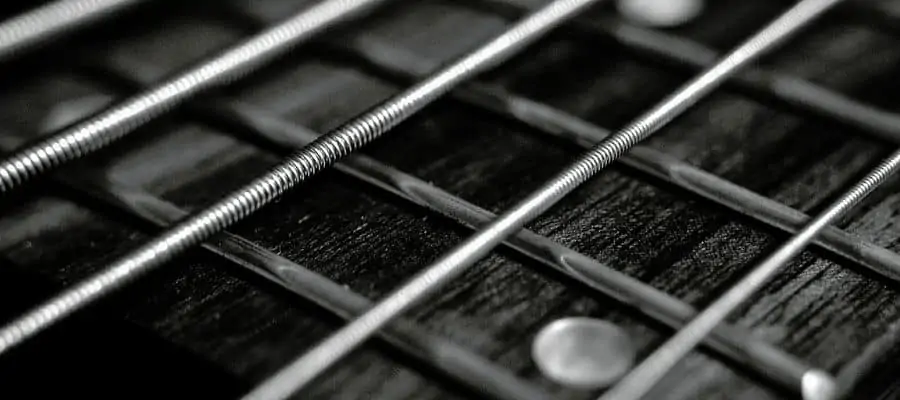
Top manufacturers in the guitar string world have both coated and uncoated string sets in their catalog.
The main advantage of coated strings is their corrosion-resistant properties. This acts very nicely against sweat, climate changes, and all sorts of dirt.
When adding a thin layer of polymer coating, you increase your string’s lifespan, reduce the corrosion rate, and sometimes eliminate unwanted string noise.
Uncoated strings will be cheaper but will also gather rust at a faster rate than coated strings. In the long run, it might be more beneficial to use coated strings.
5 Tips To Prevent Guitar Strings From Rusting
Wash Your Hands Before A Practice Session
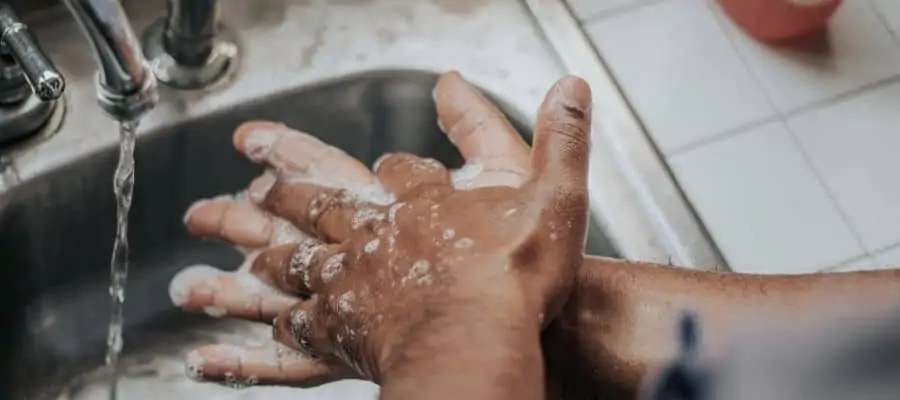
This is a pretty straightforward tip.
As I mentioned before, your hands gather throughout the day a lot of unwanted elements such as dirt, grease, and dead skin cells. These elements will activate a faster corrosion rate on your guitar strings.
By consistently washing your hands, not only do you get rid of all of these unwanted corrosive agents, but you also help your strings decrease their corrosion rate.
I’d strongly recommend you wash your hands before and after every guitar session you have. It is especially more important to do this if you have sweaty or greasy hands.
Purchase The Proper Cleaning Products For Your Strings

Having a good combo of cleaning/lubricating products will not only extend your strings’ life but also smoothen out your playing and remove unwanted friction.
Here are my 3 favorite products for your guitar:
Music Nomad String Fuel Cleaner And Lubricant
- CLEAN STRINGS to last longer and sound better with our hybrid blend of...
- REDUCE FINGER NOISE & SQUEAKING that you and your audience hear when...
- PLAY FASTER after using String Fuel because cleaner strings with the light...
- OTHER BENEFITS: Large pad covers all 6 strings in one swipe, does not hurt...
The String Fuel has a blend of high-quality natural and mineral oils to clean and sustain your strings for a long time. It also lubricates your strings to enhance playing speed.
Jim Dunlop Ultraglide 65 String Conditioner
- Comes with a felt dauber top
- Dispense enough liquid to soak the bauber before using
- Delivers a silky smooth conditioning to string surfaces
- Shields strings against tarnish and corrosion
This product is one of the most common ones you can find in a guitarist’s arsenal. Jim Dunlop’s Ultraglide 65 string conditioner is based on mineral oil and will preserve your strings from corrosion and extend their lifespan.
GHS Strings FAST FRET
- 🎸 Cleans & Protects Strings – Removes dirt, sweat, and grime to extend...
- ⚡ Enhances Playability – Provides a smooth, fast feel for effortless...
- 🔇 Reduces Finger Noise – Ideal for recording or live performance,...
- 🪵 Safe for Fingerboards – Conditions and protects wood (including...
Another product that is extremely popular and used by most guitarists. FAST FRET is a premium string cleaner and lubricant that will remove all the dirt and grime and enhance your playing speed.
Purchase Top Quality Strings
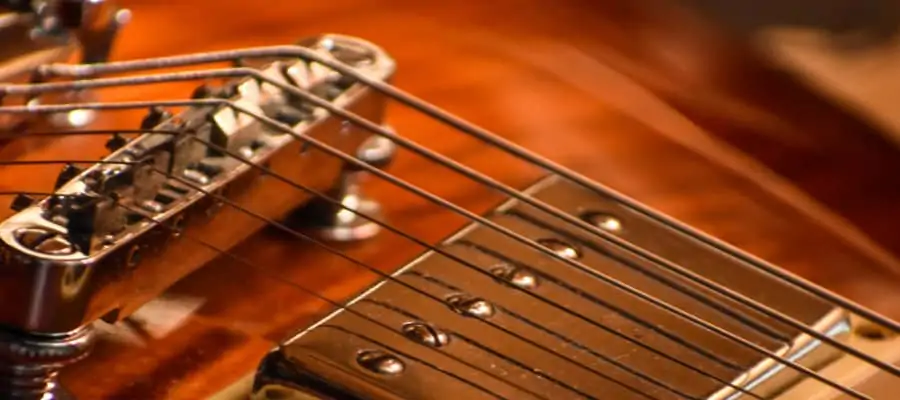
As I mentioned before, uncoated strings made of standard materials such as nickel might be cheap but gather rust at a pretty fast rate.
On the other hand, high-quality strings, especially the ones with an added layer of coating, last much longer. They also retain a good tone for longer periods.
The best brands for guitars include Ernie Ball, D’Addario, and Elixir.
These are my top 3 electric guitar string sets:
Elixir Optiweb Electric Guitar Strings
- LONGEST-LASTING TONE: Made with nickel plated steel wrap wire and our...
- BRILLIANT TONE: Elixir Strings are often rated the best electric guitar...
- CORROSION RESISTANT: Advanced technology protects from tone-deadening...
- MADE IN THE USA: Elixir Strings are lab- and field-tested and made to...
Elixir is by far one of the best string manufacturers out there and is one of my personal favorites.
These manufacturers decided to focus on different types of string coatings in search of a crystalline sound with increased corrosion resistance.
The Optiweb coating gives you a particularly bright and clear sound, but in reality, any of the other coatings Elixir offers (Nanoweb and Polyweb) are of the highest quality.
These strings will last you for a long time and are ideal for people with sweaty hands.
D’Addario XT Electric Guitar Strings
- CORROSION-RESISTANT, EXTENDED LIFE - XT Nickel electric strings feature an...
- BRIGHT, VERSATILE TONE - Nickel-plated steel wrap wire provides a bright,...
- STAYS IN TUNE, STRONGER STRING - Fusion Twist technology assures XT Nickel...
- EARN REWARD POINTS - XT Nickel strings come with a code, which you can...
There are a lot of artists out there who favor D’Addario strings over all other brands. It’s easy to understand when you have strings like these available to you.
This string set features high-carbon steel series, as well as a thin hydrophobic coating. This combination gives you great tuning stability, a fresh tone, and a ton of corrosion resistance.
Ernie Ball Slinky Cobalt Electric Guitar Strings
- Cobalt produces a stronger magnetic relationship between pickups and...
- Cobalt electric guitar strings provide an extended dynamic range,...
- Wound strings consist of Ernie Ball’s Cobalt alloy wrapped around a...
- Preferred by players across many genres, Regular Slinky’s 10-to-46 gauge...
Ernie Ball has a lot of options out there for you. This particular set uses cobalt as an improved metal alloy.
These strings respond better to the magnets on your pickups, giving you a wider dynamic range and more low-end to your sound.
They are also quite durable, so you won’t have to constantly change them.
Keep Your Guitar In A Moisture-Free Space

Moisture is the most corrosive agent you can be in contact with that you have little control over. It’s not like you can decide to move to another country or place right away or just magically change the climate.
However, a couple of things you can do are storing your guitar in the driest place in your house or purchasing an air dehumidifier.
Mind you; if you don’t live in a very humid place (like near the sea), this might not be your biggest problem. However, it never hurts to have a good dehumidifier at your place.
Always Clean Your Guitar After A Session

Out of all of the tips here, this is the most important and influential habit you can implement.
Regardless of how much you sweat, how greasy your hands usually are, and your overall hygiene, it’s a fact that you are most in contact with your guitar when playing (duh…).
Therefore, this is the time when your guitar strings are most prone to storing corrosive elements.
Suppose you make it a habit to always clean your strings, pickups, and all of the metal parts in your guitar. You can DRASTICALLY reduce all of the corrosion rates happening in your guitar and your strings.
How Quickly Do Guitar Strings Rust?
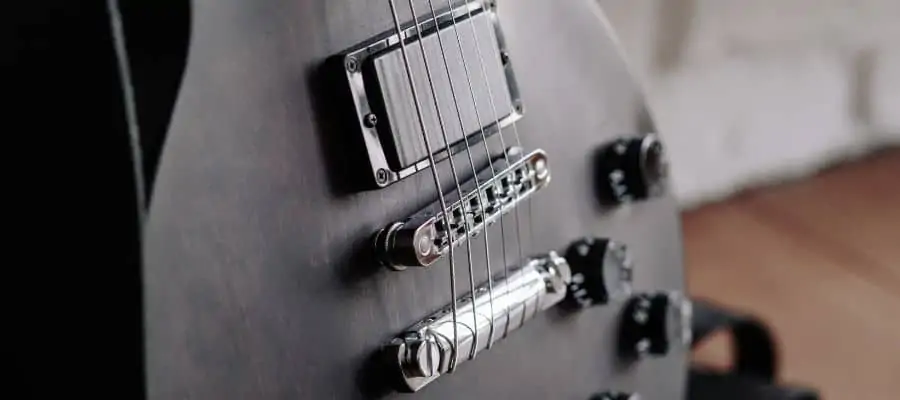
There are several factors you have to take into consideration to answer this question.
Some of these crucial factors include the types of strings you have, what are your guitar hygiene habits, what are, the climate conditions you live in, how often do you play, and what types of guitar sessions you regularly have.
The last factor is one of the most important ones when figuring out how often you should change your strings.
It is a very different scenario if you’re thinking of changing your strings for a practice session vs. a live gig or a studio recording session.
In fact, some people deem it appropriate to change their strings only until a string breaks.
For me, the rule of thumb when it comes to changing strings is: if you have an important session coming up, change your guitar strings (preferably a couple of days before to allow natural detuning).
After that, I’d say you should pay attention to whether your strings look rusty, whether you consider your strings’ tone to be dull, and whether they feel uncomfortable to play (lots of unwanted friction).
Having said all of this, the average time for strings to rust on someone who plays regularly should be around the 3-month mark.
You can keep this time frame in mind to decide when you feel you should change your guitar strings. In the end, it’s also a personal decision.
Are Rusty Guitar Strings Bad?
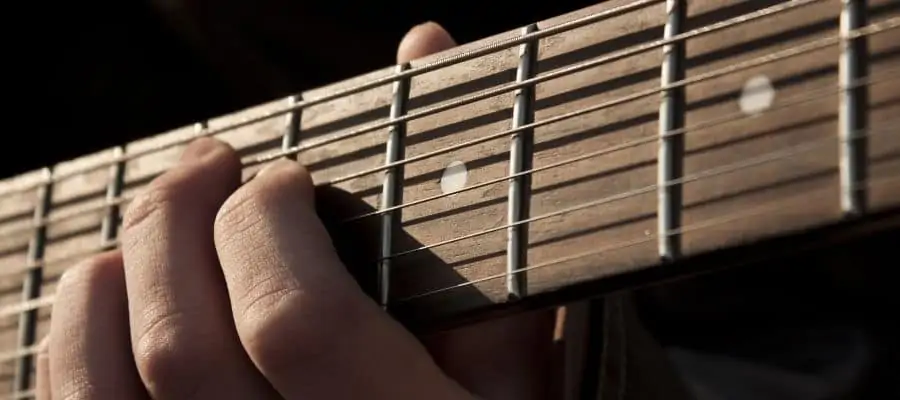
The short answer is no. The long answer is it depends.
There is a vast difference between strings that have gathered some rust and strings that have completely corroded.
Completely corroded strings will sound quite lifeless and will also be of great difficulty to play with. You might risk breaking a string or accidentally cutting your finger.
However, on the other hand, guitar strings with some rust in them give their tone a very specific character.
It’s a very used technique to have either acoustic guitars or basses with old strings. They can provide you with a mellow, “old-sounding” tone that can fit several styles and genres.
Can You Play The Guitar With Rusty Strings?

Keeping in mind what I just mentioned, yes, you can play the guitar with rusty strings.
However, you must be sure that the rust is not bad enough that you should replace them. Also, be very careful about cutting yourself.
Keep in mind that rusty strings will add more friction between your fingers and the strings. The increased friction can potentially hamper your technique and comfort.
Nevertheless, if you are looking for an old-school, vintage-sounding tone, rusty strings might do the trick.
Personally, I don’t use this technique with electric guitars, just acoustic.
Should You Boil Your Guitar Strings To Remove Rust?
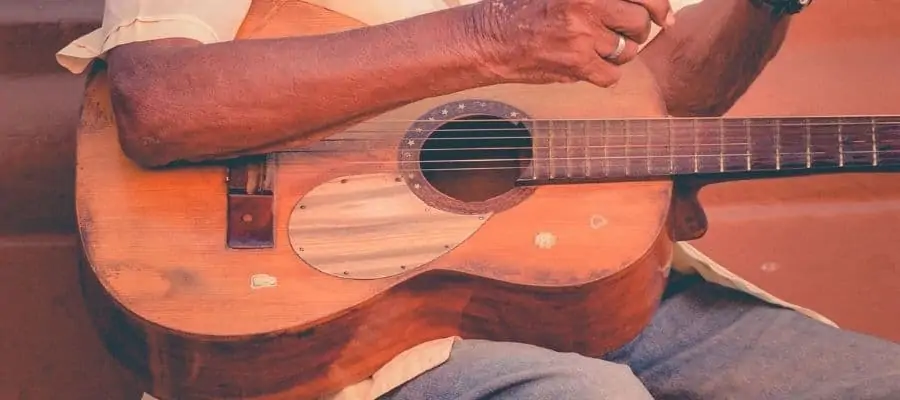
You could. Bass players do this a lot. It makes sense since bass strings are pricier and much thicker.
Even though boiling your guitar strings is effective and does remove a fair amount of rust, I would not recommend you do this with electric strings. You end up wasting time, and you would be much better off by just buying a new set of strings.
Are There Any Homemade Substances You Can Use To Clean Your Guitar?

Well, in reality, you could kinda get away with just using a soft piece of cloth and water. You could also make your own lemon oil, which proves to be effective when cleaning your strings.
I think it’s much easier and effective to purchase an approved cleaning product from a professional guitar brand.
Can You Still Save Rusty Strings?

Very similar to what I said, with boiling your strings, you can do different things to remove rust and extend your strings’ lifespan.
In all honesty, even when removing rust, the tone will not be as good as the one from a new string set.
I’d really just recommend you change your string set.
Conclusion
There are several ways you can prevent your strings from rusting at a fast rate.
By implementing good cleaning habits, purchasing good cleaning products, and investing in high-quality strings, you can drastically improve your string’s lifespan.
Not only this, but you will also enjoy a good tone for longer periods of time and save some money in the process.
If you found this article useful, you may want to save this pin below to your Guitar board.
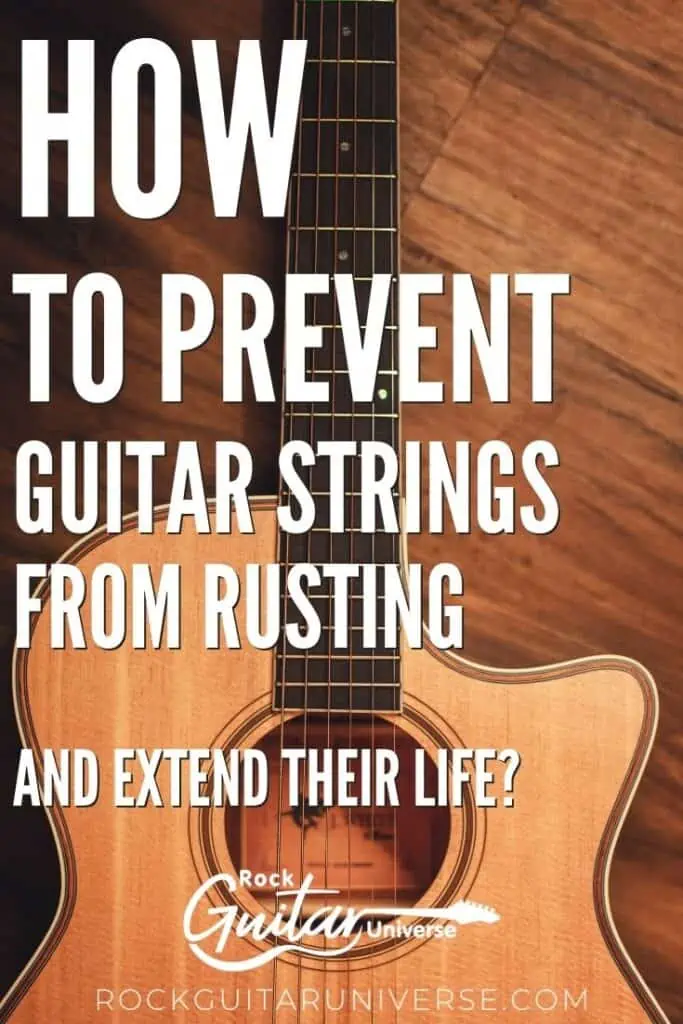
Last update on 2026-02-16 / Affiliate links / Images from Amazon Product Advertising API
Recent Posts
When learning new songs have you noticed that some of the chord sequences sound really good? But when you tried to come up with your own chord sequence, or as we call it chord progression, you found...
Some guitarists insist on buying an expensive amplifier with their electric guitar. They assume that this is a must for every type of guitarist out there. However, in some situations, this isn’t...

